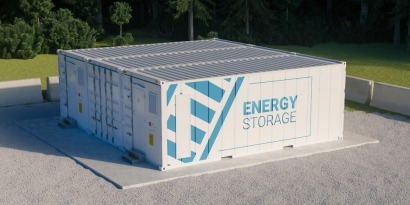
This new analysis from LCP Delta comes as it launches its new energy storage analytical platform STOREtrack, which provides unique market insight for investors and analysts into the European energy storage market. The platform provides users with access to data and analytics for 25 markets across Europe and delivers insight into current energy storage capacity as well as future pipelines for new assets to come on stream. Users are also able to access information on individual assets including total power and battery duration, technology type, asset owner and financiers.
European hub for growth
Growth has been concentrated in Western Europe as the markets in Great Britain and Ireland remain the largest and most advanced, accounting for 56% of all new European activity since 2018 as well focusing on larger battery storage capacity, with the average capacity for Great Britain being 42MW, while Ireland's is 28MW.
Battery storage trends in Germany and France are also on an upward trajectory, though projects remain smaller with the average battery capacity in Germany 10MW. France in particular is characterised by a higher number of smaller batteries, the average being 3MW. This reflects the differing market opportunities, system needs, and regulation in each country.
LCP Delta expects to see further strong market growth in 2023, with 3.7GW of new capacity set to be added, driven by the emergence of 100MW mega-projects. STOREtrack data is recording grid-scale projects commencing development in a growing number of countries across Europe including Belgium, Finland, Germany, Hungary, Italy, Lithuania, Netherlands, Portugal, Sweden and Slovenia. Italy in particular is a strong growth market over the next 2-3 years, with already over 25 grid-scale projects under development.
While the European market is growing rapidly and will continue to do so, it is also becoming increasingly competitive and fragmented. STOREtrack data shows there are 923 companies already active in the market, with the vast majority currently only involved in smaller scale projects and only a quarter involved in projects of 50MW or more.
Commenting on the trends in energy storage, Jon Ferris, Head of Flexibility and Energy Storage, LCP Delta said, "Our analysis provides strong data on a project-by-project basis of where investment is being deployed, what companies are driving this and the opportunities across Europe to get involved in new projects before they become widely known. With more than 900 companies already involved in the market, understanding the segments, partners, and project roles to focus on will be critically important. We see exciting opportunities ahead, but I expect the level of competition to be high."
Across Europe, STOREtrack also provides investors and analysts with data and insights into the key players in the storage market. For example, Enel is by far the largest business operating in the space, having benefitted from their success in the Italian capacity auction. But market development is mainly characterised by an emerging ecosystem of partnerships due to the fact the majority of market participants lack the vertical integration of large energy companies.
Commenting on the new platform STOREtrack, Ferris added, "Energy storage is rapidly coming to front of mind for investors and analysts as they look for opportunities to make strategic investments in the wider net zero journey. As battery duration lengthens, investors can now see opportunities for their assets to play a role in wholesale markets, adding new revenue streams in the process.
"STOREtrack allows investors and analysts to develop insights into the energy storage opportunities across Europe and make strategic decisions on investment plans. Through the platform, users can build an in-depth picture of this growing asset class by analysing a range of data sets including financers, operators, owners, developers, and the technology providers."

